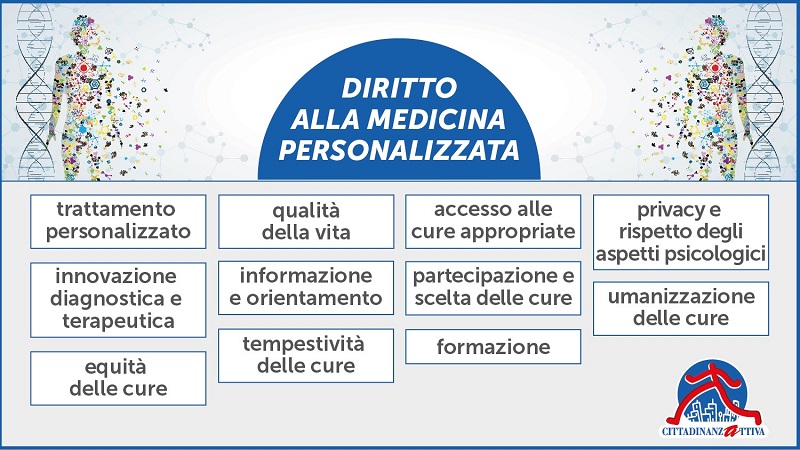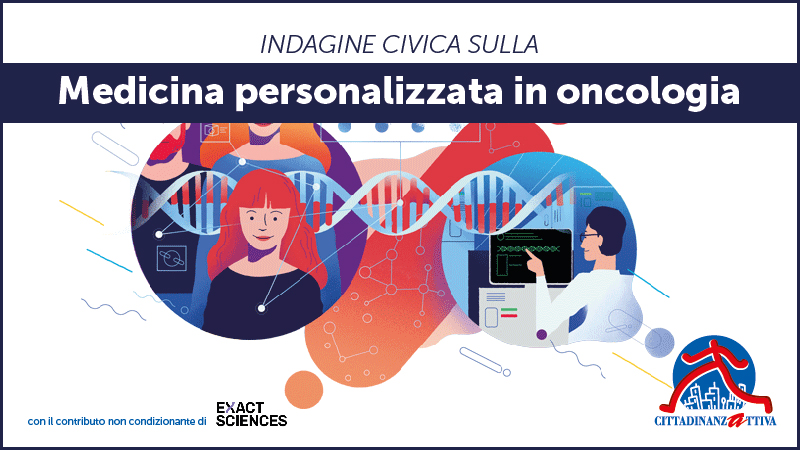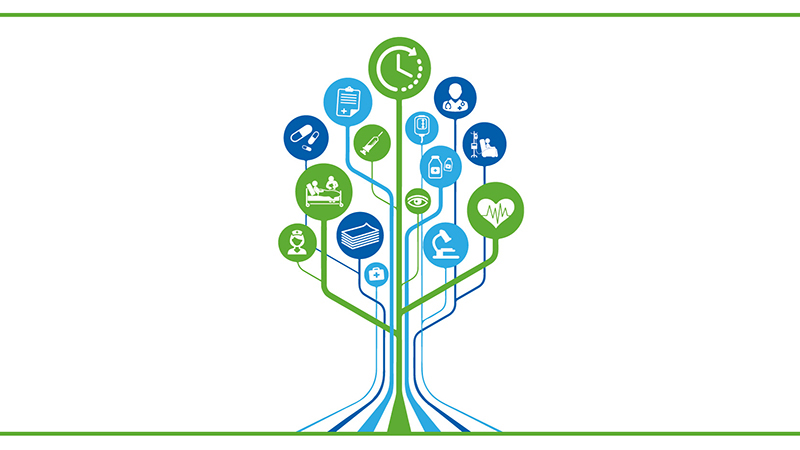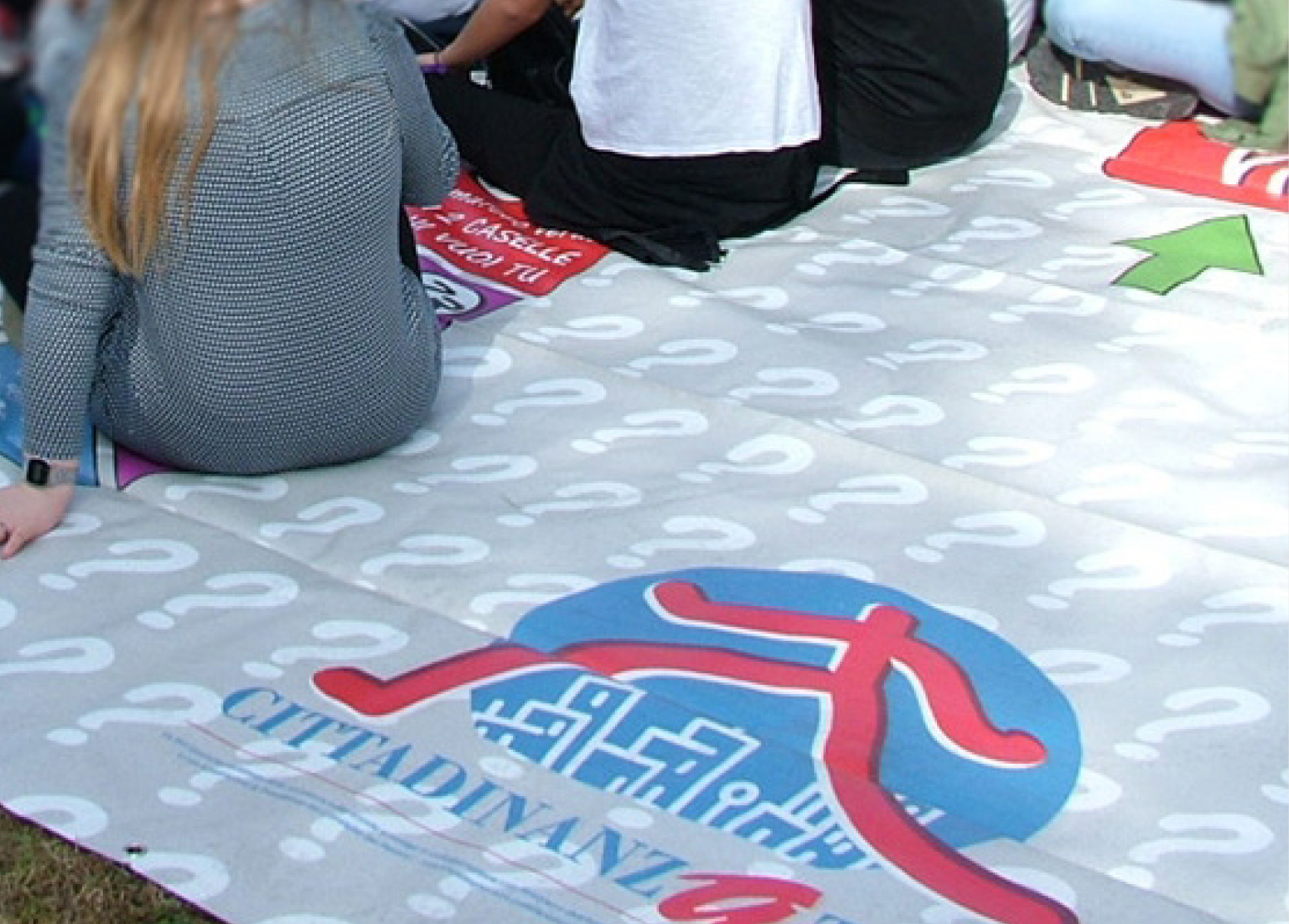
From the opportunities offered by personalized medicine to the definition of 11 rights and the explanation of 6 concrete actions made to support patients with cancer.
This is the meaning of the Manifesto for the right to personalized medicine, promoted by Cittadinanzattiva, with the unconditional contribution of Roche, which will be presented today during a live webinar at 3:30 pm on the Cittadinanzattiva Facebook page. The Manifesto was drawn up thanks to the joint work with scientific societies, doctors, and patient associations.
In the recent years, a model that bases the treatment on the genetic alterations of the tumor and no longer on the tumor site organ itself through the use of gene sequencing tests and targeted therapies is being consolidated. As several studies have shown, when specific genetic mutations in the tumor are identified, many patients benefit from better clinical results, a greater therapeutic adherence, and a better quality of life.
"Personalized medicine in oncology, however, should not only be considered as a personalization of diagnosis and therapy (based on the specific molecular characteristics of the tumor, the so-called precision medicine), but as a global vision of personalized care, based on the specificity of the individual, in a treatment path that puts the single patient at the center both from the therapeutic point of view and from the point of view of the quality of life. We believe it is essential that citizens are aware of this, that they know how to assert their rights and that they are vigilant and the first actors of change" - says Antonio Gaudioso, Secretary General of Cittadinanzattiva. "With this work we want first of all to inform patients about their rights and consolidate their central role through conscious and active participation in all decisions concerning their treatment path. We also want the Manifesto to be at the same time a tool in support of the National Health Service and of health professionals, indicating paths and strategies useful for the implementation of the model of personalized medicine, the implementation of which will require an important adjustment from the point of view of health governance and the various actors involved".
The Manifesto indicates 11 patients' rights: the right to personalized treatment; diagnostic and therapeutic innovation; equity of care; quality of life; information and guidance; timeliness of care; access to appropriate care; participation and choice of care; training; privacy and respect for psychological aspects; humanization.
For an effective implementation of the Manifesto, it is necessary to focus decisively on some concrete actions:
- favor the full involvement of the patient in the treatment process, from diagnosis to follow-up, in order to improve health outcomes;
- favor the psychophysical well-being not only of the patient but also of those who assist him/her. In this perspective, it will be necessary to focus on the synergy between patient/caregiver and healthcare worker, implementing channels of communication and dialogue through the greater use of tools such as telemedicine and teleconsultation when possible in the context of the proposed therapy;
- include new diagnostic tests on molecular alterations (NGS) in the Essential Levels of Assistance (Lea) and define uniform tariffs for refund to the Regions. In Italy, there are strong territorial differences that over time have led to and are still today developing great inequalities between citizens in the use of accessible and quality services. In the area of accessibility to gene sequencing tests (NGS), there are few regions that guarantee their provision; in other regions, which have not provided for the inclusion of the tests in the regional Essential Levels of Assistance (LEA), patients cannot actually use them, except through a fee, or are forced to move to regions where they are provided. As a result, access to targeted therapies is also partly compromised. In this respect, in order to ensure appropriate access to targeted medicines for patients, regulatory developments and changes to the conditions of accessibility foreseen under the current rules are necessary.
- clearly define, through specific guidelines, the criteria of access for patients to the use of gene sequencing methods (NGS) and start an evaluation of the structures eligible for the use of NGS technology and targeted therapies, favoring organizational modalities also between regions to guarantee the same treatment opportunities to every citizen;
- promoting the establishment of groups of experts in different disciplines (Molecular Tumor Board) on the territory according to precise and shared standards and in close connection with each other, through a network of collaboration and a continuous exchange of information. To this end, it is essential to implement a unique and transparent information platform that connects the various oncology centers to the Molecular Tumor Boards.
- promote and ensure the training of specialized personnel in particular on: technical skills for the future development of NGS tests; consolidation of a culture of privacy that balances information needs for scientific purposes and the respect and involvement of the person; relational aspects that allow professionals to collect information that affects individual susceptibility to the disease and at the same time create a better empathic approach and a better relationship of trust.
(document translated by Maira Cardillo, ACN staff)












